Jeanne Hoban, known after her marriage as Jeanne Moonesinghe, was a British Trotskyist who became active in trade unionism and politics in Sri Lanka. She was one of the handful of European Radicals in Sri Lanka.

Kala Keerthi Regi Siriwardena was a Sri Lankan academic, journalist, poet, writer, playwright and writer of screenplays.

Education in Sri Lanka has a long history that dates back two millennia. While the Constitution of Sri Lanka does not provide free education as a fundamental right, the constitution mentions that 'the complete eradication of illiteracy and the assurance to all persons of the right to universal and equal access to education at all levels" in its section on directive principles of state policy at (27. Sri Lanka's population had an adult literacy rate of 96.3% in 2015, which is above average by world and regional standards. Computer literacy in 2017 28.3% and phone users in 2017 105%, website users 32% in 2017. Education plays a major part in the life and culture of the country, which dates back to 543 BC. Sri Lanka's modern educational system modeled after Christian missionary system was brought about by its integration into the British Empire in the 19th century. Education currently falls under the control of both the Central Government and the Provincial Councils, with some responsibilities lying with the Central Government and the Provincial Council having autonomy for others. Education institutions with a tradition dating back to 5 BC are largely ignored by the state.

Patrick de Silva Kularatne was a Sri Lankan educationist and politician. He was a Member of the State Council of Ceylon (1942-1947) and Member of Parliament (1960-1965). He served as Principal of Ananda College and Dharmaraja College and established Nalanda College Colombo, Ananda Balika Vidyalaya, Moratuwa Vidyalaya and Dharmapala Vidyalaya. As a member of the executive committee on Education, he played an instrumental role in the realisation of free education from kindergarten to university.
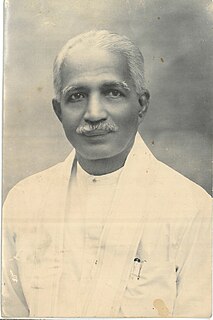
Dr. Cristopher William Wijekoon Kannangara was a Sri Lankan Lawyer and a politician. He rose up the ranks of Sri Lanka's movement for independence in the early part of the 20th century. As a lawyer he defended the detainees that were imprisoned during the Riots of 1915, many of whom were the emerging leaders of the independence movement. In 1931, he became the President of Ceylon National Congress, the forerunner to the United National Party. Later, he became the first Minister of Education in the State Council of Ceylon, and was instrumental in introducing extensive reforms to the country's education system that opened up education to children from all levels of society.

Yashoda Wimaladharma is a Sri Lankan actress in Sri Lankan cinema, stage drama and television. Often referred to as the "innocent on the small screen", Wimaladharma excelled in cinema, television and theatre in a career spanning more than three decades. Through her experience in domestic and foreign cinema, she is also working as a jury member of foreign cinema festivals.

Deshamanya Nissanka Parakrama Wijeyeratne, known as Nissanka Wijeyeratne, was a Sri Lankan politician, civil servant, diplomat and English language poet. He was also the Diyawadana Nilame of the Sri Dalada Maligawa, Kandy from 1975 to 1985. At the time of death he was serving as the chairman of The Law and Society Trust in Sri Lanka.

Gunapala Piyasena Malalasekera, OBE, JP was a Sri Lankan academic, scholar and diplomat best known for his Malalasekara English-Sinhala Dictionary. He was the Ceylon's first Ambassador to the Soviet Union, Ceylon's High Commissioner to Canada, the United Kingdom and Ceylon's Permanent Representative to the United Nations in New York. He was the Professor Emeritus in Pali and Dean of the Faculty of Oriental Studies.

Danister Thomas Fernando is a pioneer Sri Lankan lyricist. Some of the pioneers, whose names most people could not even remember were honoured. The oldest lyricist, D. T. Fernando, was a forgotten name.
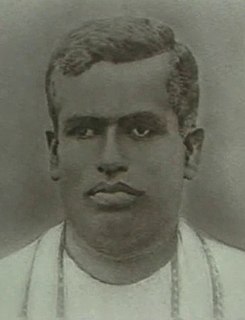
Kumaratunga Munidasa was a pioneer Sri Lankan (Sinhalese) linguist, grammarian, commentator, and writer. He founded the Hela Havula movement, which sought to remove Sanskrit influences from the Sinhala language. Considered one of Sri Lanka's most historically significant scholars, he is remembered for his profound knowledge of the Sinhala language and its literary works.
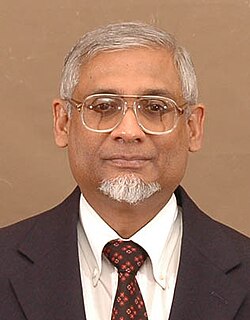
Dr. Amal Uthum Herat born in Colombo, Sri Lanka was Deputy Governor of the Central Bank of Sri Lanka and Alternate Executive Director of the International Monetary Fund.
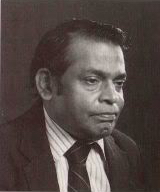
Ran Banda Seneviratne was a Sri Lankan lawyer, author, lyricist, television and radio presenter.
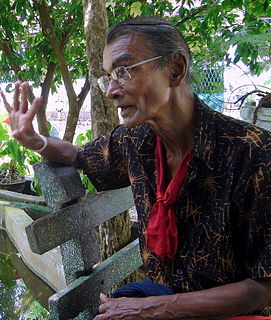
Kala Keerthi Dr. Gamini Kalyanadarsha Haththotuwegama was a Sri Lankan playwright, director, actor, critic and educator. He was widely known as the father of Sri Lanka's modern street theatre. He was among the most influential directors of post-independent Sri Lanka.
Mervyn de Silva was a Sri Lankan journalist. He was the editor in chief of Lake House and of The Times of Ceylon, editor of the Ceylon Daily News and the Lanka Guardian.
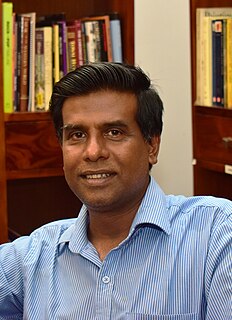
Malinda Channa Pieris Seneviratne is a Sri Lankan poet, critic, journalist, translator, political commentator, and activist. Known for his outspoken political views, his opinion pieces are among the most widely read in English in Sri Lanka. His poetry collections and translations of Sinhala texts have also been widely read and acclaimed, and have been frequently shortlisted for the prestigious Gratiaen Award. On February 17, 2021, he assumed duties as the Director of the Hector Kobbekaduwa Agrarian Research and Training Institute.

Kalutara Koralalage Edward Winifred Brito Adikaram was an educationalist, writer, social activist and a philosopher in Sri Lanka. In 1931 he obtained an M.A degree from London School of Oriental Studies and in 1933 a PhD on the thesis "Early History of Buddhism in Ceylon". After returning to Sri Lanka he started to teach in Ananda Sastralaya, Kotte and in 1934, he became the principal of the school. He was a prominent nonviolence activist in Sri Lanka.
Crescent Schools International, is an international school in Sri Lanka, with four branches in Colombo 9, Colombo 15, Wellampitiya and Ratnapura. It was established in 1986 with a view to provide quality education in English medium in an Islamic environment.
Trinity College, Kandy, is an independent private school for boys in Kandy Sri Lanka. It was founded in 1872 by British Anglican missionaries of the Church Missionary Society, modelled on British Public school tradition. Trinity offers primary and secondary education, and is a leading private school in Sri Lanka managed by the Anglican Church of Ceylon.

Daya Dissanayake is a bilingual Sri Lankan novelist, poet and blogger. His work spans a critical study of king Ashoka, nine novels in English, six novels in Sinhala and a collection of poems, and numerous articles in newspapers, journals and magazines. He is the author of the first e-novel in Asia, 'The Saadhu Testament' (1998), and the first e-novel in Sinhala, 'Vessan Novu Wedun' (2003). His first nonfiction work is "Who is Ashoka?" He is the only Sri Lankan writer to receive the Sri Lankan State Literary Award for the best English novel three times and was awarded the SAARC Literary Award in 2013. Being the first Sri Lankan to release his work online and for free access, he is often seen as one of Sri Lanka's earliest and most vocal advocates for the ebook format, copyleft and Creative Commons.
Kaushalya Fernando, is a Sri Lankan actress, director, producer and a civil activist. Highly versatile actress who dominated stage drama and cinema, Fernando is a five-time winner of the prestigious best actress award at the State Drama festival. She is the daughter of popular theatre director late Somalatha Subasinghe.















